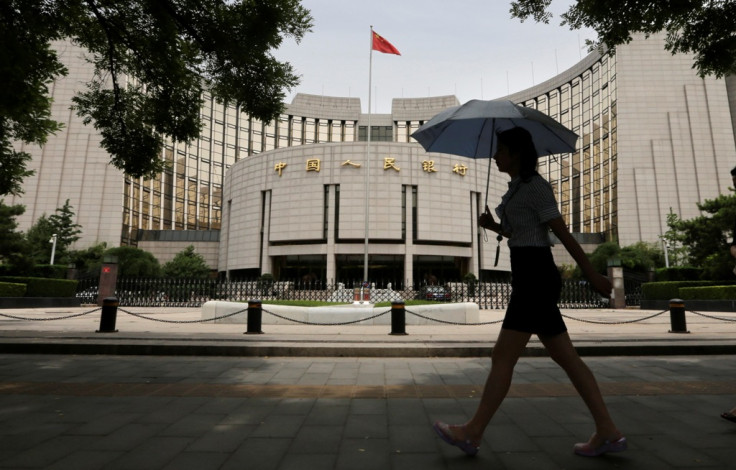People's Bank of China Likely to Keep Rates Elevated Amid Chinese Asset Bubbles

China's money markets are indicating that the nation's central bank has little room to alter its focus, from containing asset bubbles, to reviving a deteriorating economy.
The seven-day repurchase rate sank to a 22-month low of 2.22% on 12 March, a day after the People's Bank of China sold 100bn yuan ($16.3bn) of 28-day repos at 4%, the biggest issuance of such contracts since June 2011.
The one-year swap, the fixed cost to receive the seven-day repo, was a record 2 percentage points higher than the benchmark on 7 March. The gap was 190 basis points on 12 March.
All the PBOC can do is try to balance well so that it's not braking a high-speed car too abruptly or fueling a bubble that's already too big.
"China is walking on a wire when it comes to monetary policy and that wire is getting thinner and thinner," said Zhou Yanwu, a research director at Beijing-based ResearchInChina.
"All the PBOC can do is try to balance well so that it's not braking a high-speed car too abruptly or fueling a bubble that's already too big," Zhou told Bloomberg.
"We don't really think the flush liquidity conditions will be sustained," said Becky Liu, a Hong Kong-based rates strategist at Standard Chartered.
"If money-market rates stay as low as the current levels, it's not supportive of their plan -- that they still want the banking system to go through a deleveraging and they don't want to inflate the shadow-banking bubble," Liu told the news agency.
Goldman Sachs Hong Kong-based analyst MK Tang said in a 11 March note to clients: "China's interest-rate policy needs to strike a balance between managing the economic cycle and containing financial fragility, including from opaque bank credit that is moved off the formal loan book."
"We are watchful for signs of a possible resurgence in opaque bank credit, as this would be a major swing factor for interest rates."
Barclays Capital said in a 10 March note to clients: "In view of the soft CPI inflation in January-February and moderate inflation pressures, we lower our full-year inflation forecast to 2.7% from 3.1% previously (2013: 2.6%). On the monetary policy outlook, we expect the PBoC to maintain easier liquidity conditions in H1 in view of rising financial risks.
"The well-contained inflation pressures will support a dovish PBoC. We believe a RRR cut could be triggered by a systemically important credit event, significant capital outflows or sharp deteriorating growth outlook in Q2, but these are not yet our baseline."
China Data
Official data over the weekend highlighted the steepest drop in exports since 2009 and the slowest inflation in 13 months. Together they have mounted pressure on PBoC governor Zhou Xiaochuan to evaluate his bank's "prudent" monetary policy.
Goldman Sachs forecast the repo rate would rise to 4.25% by year-end and even higher if there is a revival in "opaque bank credit."
Default Risk High
Last week, Chinese solar equipment maker Shanghai Chaori Solar Energy Science & Technology missed a deadline to make interest payments on its corporate bonds, resulting in the country's first onshore default.
Analysts have listed metals and mining, shipbuilding and materials as the key sectors with high default risks.
Last Lever
The yuan's exchange rate becomes "the obvious remaining policy lever left to pull" for China to support its economy, Richard Iley, a Hong Kong-based economist at BNP Paribas said in a 3 March note to clients.
"Any genuine attempt to rein in excessive credit growth is quietly being shelved as growth momentum continues to ebb," Iley said. The yuan would probably need to weaken further to loosen financial conditions to steer growth, he added.
Shadow Banking
Bill Gross, the boss of the world's largest bond fund at Pacific Investment Management, in February, dubbed China the "mystery meat" of emerging markets, flagging up the region's lack of transparency.
China's government has praised its much-debated shadow banking system, saying it played a positive role in boosting its economy. However, critics argue that it helped fuel a surge in the country's debt levels.
In addition, analysts are of the view that default risk is very high in shadow banking products, and they expect more bad news from the sector.
Shadow banking has experienced rapid growth in China in recent years, with trust assets surging 46% in 2013 to a record 10.9tn yuan. Trusts lured investors with promises of higher interest rates than official rates.
© Copyright IBTimes 2025. All rights reserved.



















